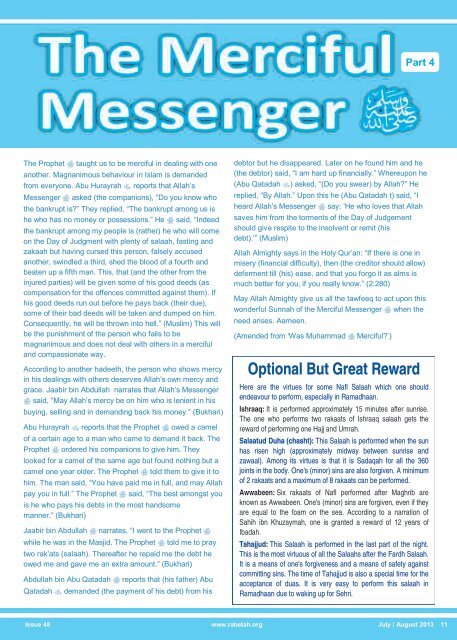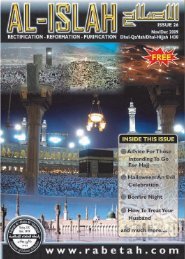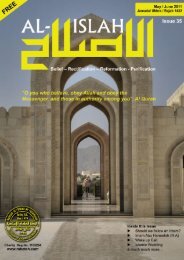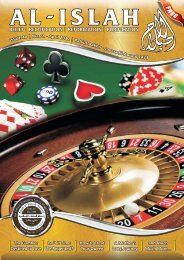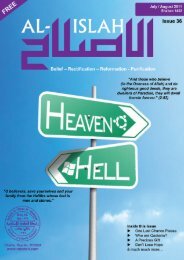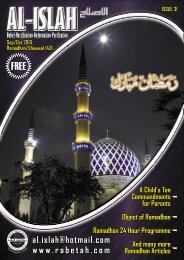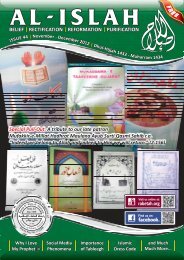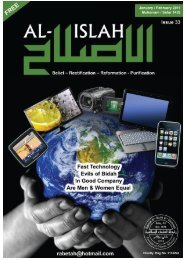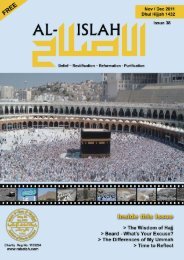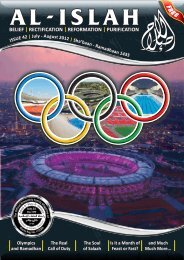Managment
Download (PDF, 4.8MB) - Rabetah
Download (PDF, 4.8MB) - Rabetah
- No tags were found...
Create successful ePaper yourself
Turn your PDF publications into a flip-book with our unique Google optimized e-Paper software.
Part 4<br />
The Prophet taught us to be merciful in dealing with one<br />
another. Magnanimous behaviour in Islam is demanded<br />
from everyone. Abu Hurayrah reports that Allah’s<br />
Messenger asked (the companions), “Do you know who<br />
the bankrupt is?” They replied, “The bankrupt among us is<br />
he who has no money or possessions.” He said, “Indeed<br />
the bankrupt among my people is (rather) he who will come<br />
on the Day of Judgment with plenty of salaah, fasting and<br />
zakaah but having cursed this person, falsely accused<br />
another, swindled a third, shed the blood of a fourth and<br />
beaten up a fifth man. This, that (and the other from the<br />
injured parties) will be given some of his good deeds (as<br />
compensation for the offences committed against them). If<br />
his good deeds run out before he pays back (their due),<br />
some of their bad deeds will be taken and dumped on him.<br />
Consequently, he will be thrown into hell.” (Muslim) This will<br />
be the punishment of the person who fails to be<br />
magnanimous and does not deal with others in a merciful<br />
and compassionate way.<br />
According to another hadeeth, the person who shows mercy<br />
in his dealings with others deserves Allah’s own mercy and<br />
grace. Jaabir bin Abdullah narrates that Allah’s Messenger<br />
said, “May Allah’s mercy be on him who is lenient in his<br />
buying, selling and in demanding back his money.” (Bukhari)<br />
Abu Hurayrah reports that the Prophet owed a camel<br />
of a certain age to a man who came to demand it back. The<br />
Prophet ordered his companions to give him. They<br />
looked for a camel of the same age but found nothing but a<br />
camel one year older. The Prophet told them to give it to<br />
him. The man said, “You have paid me in full, and may Allah<br />
pay you in full.” The Prophet said, “The best amongst you<br />
is he who pays his debts in the most handsome<br />
manner.” (Bukhari)<br />
Jaabir bin Abdullah narrates, “I went to the Prophet <br />
while he was in the Masjid. The Prophet told me to pray<br />
two rak’ats (salaah). Thereafter he repaid me the debt he<br />
owed me and gave me an extra amount.” (Bukhari)<br />
Abdullah bin Abu Qatadah reports that (his father) Abu<br />
Qatadah demanded (the payment of his debt) from his<br />
debtor but he disappeared. Later on he found him and he<br />
(the debtor) said, “I am hard up financially.” Whereupon he<br />
(Abu Qatadah ) asked, “(Do you swear) by Allah?” He<br />
replied, “By Allah.” Upon this he (Abu Qatadah t) said, “I<br />
heard Allah’s Messenger say: ‘He who loves that Allah<br />
saves him from the torments of the Day of Judgement<br />
should give respite to the insolvent or remit (his<br />
debt).’” (Muslim)<br />
Allah Almighty says in the Holy Qur’an: “If there is one in<br />
misery (financial difficulty), then (the creditor should allow)<br />
deferment till (his) ease, and that you forgo it as alms is<br />
much better for you, if you really know.” (2:280)<br />
May Allah Almighty give us all the tawfeeq to act upon this<br />
wonderful Sunnah of the Merciful Messenger when the<br />
need arises. Aameen.<br />
(Amended from ‘Was Muhammad Merciful?’)<br />
Optional But Great Reward<br />
Here are the virtues for some Nafl Salaah which one should<br />
endeavour to perform, especially in Ramadhaan.<br />
Ishraaq: It is performed approximately 15 minutes after sunrise.<br />
The one who performs two rakaats of Ishraaq salaah gets the<br />
reward of performing one Hajj and Umrah.<br />
Salaatud Duha (chasht): This Salaah is performed when the sun<br />
has risen high (approximately midway between sunrise and<br />
zawaal). Among its virtues is that it is Sadaqah for all the 360<br />
joints in the body. One's (minor) sins are also forgiven. A minimum<br />
of 2 rakaats and a maximum of 8 rakaats can be performed.<br />
Awwabeen: Six rakaats of Nafl performed after Maghrib are<br />
known as Awwabeen. One's (minor) sins are forgiven, even if they<br />
are equal to the foam on the sea. According to a narration of<br />
Sahih ibn Khuzaymah, one is granted a reward of 12 years of<br />
Ibadah.<br />
Tahajjud: This Salaah is performed in the last part of the night.<br />
This is the most virtuous of all the Salaahs after the Fardh Salaah.<br />
It is a means of one's forgiveness and a means of safety against<br />
committing sins. The time of Tahajjud is also a special time for the<br />
acceptance of duas. It is very easy to perform this salaah in<br />
Ramadhaan due to waking up for Sehri.<br />
Issue 48 www.rabetah.org July / August 2013 11


